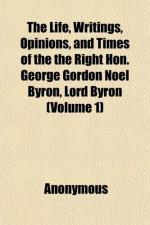|
This section contains 5,037 words (approx. 17 pages at 300 words per page) |

|
SOURCE: Shilstone, Frederick W. “Byron's ‘Mental Theatre’ and the German Classical Precedent.” Comparative Drama 10, no. 3 (fall 1976): 187-99.
In the following essay, Shilstone investigates the influence of German classical drama on Byron's plays, contending that his “dramas are chief among those designed to expand the boundaries of Romantic lyric expression.”
British Romantic drama, and that of Byron in particular, is usually a victim of condescending treatment—an understandable, if unsatisfying critical fact. On the practical side, there can be no doubt that stage performances of the nineteenth century were not conducive to the production of a serious modern English drama; Byron himself was disgusted by the almost complete predominance of spectacle, what Aristotle calls the most obviously incidental tragic element. Revivals of dramatic classics and the flawed attempts of young playwrights were alike designed to satisfy the public desire for passion, glitter, and sheer magnitude. Aesthetic theorists declare the...
|
This section contains 5,037 words (approx. 17 pages at 300 words per page) |

|


